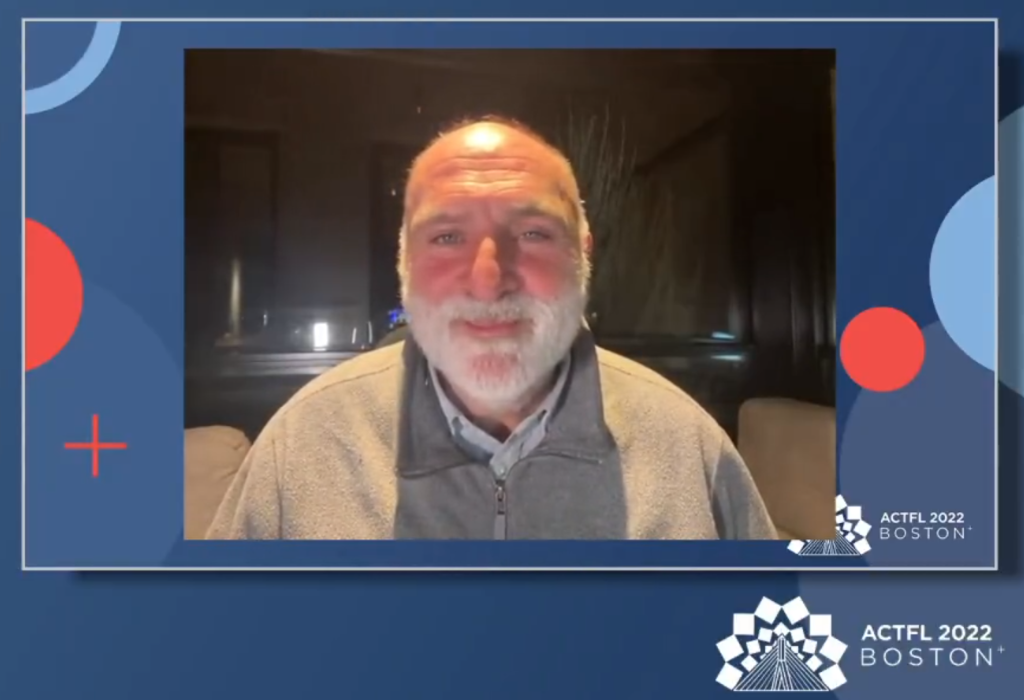Studying world languages helps students learn more about other people, cultures and countries beyond their own, and more understanding is better for everyone, said Jose Andres, chef and humanitarian, during his appearance as keynote speaker at Friday’s opening session of the ACTFL Annual Convention and World Languages Expo in Boston. The assembled audience let out a groan of disappointment when ACTFL President Victoria Russell said Andres would be unable to appear at the event in person.
Andres and his nonprofit humanitarian organization, World Central Kitchen, have been working in Kershon, Ukraine, in recent days to feed people in the city that recently wrested back control from Russia’s military. He noted that even if stores were open, people are without money to feed themselves or their families.
With the help of journalists from the Associated Press, Andres was able to connect with Russell on the previous day for a nearly one-hour Q&A that was shown to the in-person audience in Boston and those attending the conference virtually.
World languages help Andres help others
Born in Spain, Andres noted that he has an eighth-grade education but speaks Spanish, Catalan, English and some French — enough to “express myself” and says he is never afraid to try to communicate.
Andres discussed a wide range of topics, such as his childhood in Barcelona, his military service, cooking, immigration, Dreamers and the importance of multilingualism to the future of the US and the world.
Andres, who said he was humbled by the opportunity to talk to teachers of world languages, challenged educators to speak up when they see something that needs to change to make the world a better place. He asked them to work together to use their ideas to make schools better to grow the future leaders, doctors, nurses, farmers and others in society.“I do believe that it is very important to take this responsibility seriously and beyond. I know you take the responsibility seriously,” he said. “I know you give your best and then some more.”
How children help in crisis areas
Andres shared stories of hope that he has experienced on humanitarian trips, where children often step up to serve others and to use their bilingual skills to assist him and his team feed those in need. These experiences inspire him to keep doing what he does, he said, because the best of humanity can be seen amid the worst of humanity, such as war. The world should be the classroom for students, he said, urging teachers to take groups of students to “faraway places” to learn where languages are spoken and where historical events have occurred, instead of learning from books or photos.
Russell, a professor of Spanish and foreign language education at Valdosta State University in Georgia, shared that her summer trips to southern Spain are life-changing for the 20 to 30 students who take the annual voyage.“Your words were music to my ears because I see their (students’) lives are transformed, and they come back different people,” Russell said to Andres.
Such travel promotes understanding and empathy for others, said Andres, who periodically sipped from a wine glass during the conversation.
“People have a tendency to say we are many races on planet Earth. I am a firm believer that the planet Earth has only one race,” holding up his right index finger to the camera for emphasis. “And that is the human race. And that’s what brings us together.”
Variations in physical characteristics, religion and other traits are the things that make people “unique and interesting,” he said.
Andres’ father used paella for life lesson
Asked about cooking, Andres reflected on his childhood managing the open fire while his father made paella. One day, Andres wanted to do the cooking, but his father refused. Later, his father explained why: “The most important thing is knowing how to make the fire, controlling the fire. Control the fire and you can make anything that you want.”
His father, Andres said, was giving him hope and belief in himself with this metaphor for life. Andres said he’s taught this lesson to his three daughters — the youngest two are in college — since they were young. One day I hope my daughters will pass the lessons on to their future children.
He closed his remarks to urge those watching, regardless of political affiliations, to contact their elected leaders to express support for Ukraine as the country continues to fight a war brought to its land by Russia.
“These wars in the 21st century have no place,” said Andres, noting the thousands of civilians who have died, hundreds of schools that have been destroyed and students who have been without schooling for 10 months.
He urged the “speaking of more languages so we can all speak to each other with heart and truth. We cannot anymore be supporting war in any country, especially right now in Ukraine.”
In the final moments of their conversation, Russell urged Andres to stay safe amid his important work before they said goodbye and thank you to each other in various world languages.
Trigie Ealey is an education editor at SmartBrief.
Opinions expressed by SmartBrief contributors are their own.
_________________________
Subscribe to SmartBrief’s FREE email ASCD newsletter to see the latest hot topics in education. It’s among SmartBrief’s more than 250 industry-focused newsletters.
